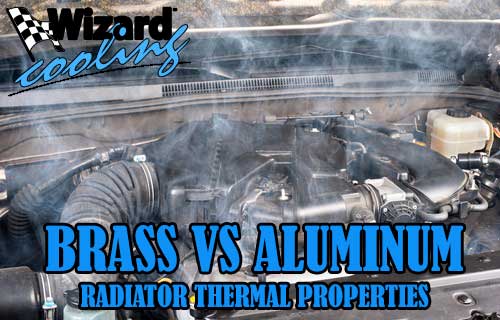BRASS VS. ALUMINUM: RADIATOR THERMAL PROPERTIES

Around 25-30 years ago a big change happened across the auto and cooling industry, most auto-manufacturers switched from copper/brass radiators to aluminum radiators. Although some people speculate that this was done for a cost benefit reason, the primary reason for changing to aluminum radiator was simple; aluminum radiators are more efficient in terms of their thermal properties. Aluminum radiators dissipate heat better and more effectively than copper/brass radiators.
When comparing copper/brass radiators to aluminum radiators it’s important to first think about the materials used and their advantages and disadvantages. Although copper has better thermal conductivity than aluminum, copper is too soft to build a radiator from. Since copper is too soft for radiator construction, zinc is added to the copper to create the alloy brass. Brass has a much stronger structure and is suitable to build radiators. But there is a take away; the lost of efficient thermal conductivity.The alloy brass only has about ½ the thermal conductivity compared to aluminum (see the chart below).
Copper 406-430 Watts/Meters/KAluminum 353-390Brass 109-125
Aside from the differences in the thermal properties of the different radiators, there are also some other important advantages gained when switching to aluminum radiators. The two primary factors to consider when evaluating why a aluminum radiator is more effective than older copper/brass radiators in regards to overall vehicle performance and cooling ability are:
Weight Reduction- Aluminum radiator are much lighter than brass radiators. Weight reduction is the single most all encompassing upgrade to any vehicle's performance. It improves acceleration, braking, and fuel economy.
Material Stability and Ruggedness- Aluminum is a much stronger and more durable material compared to brass. This allows aluminum radiator cores to feature larger, “skinner” tubes which allow a greater volume of coolant to enter the core and be cooled. The strength of an aluminum core and tubes also allows for greater cooling system pressure which can allow a smaller radiator to cool better.
In short, aluminum radiators mark a modern advancement in cooling. Not only does the material dissipate heat at close to double the rate compared to brass, but also reduced the overall weight of the vehicle and provides a stronger and more durable core and tube design. All these factors clearly lead to an overall increase in vehicle performance.
